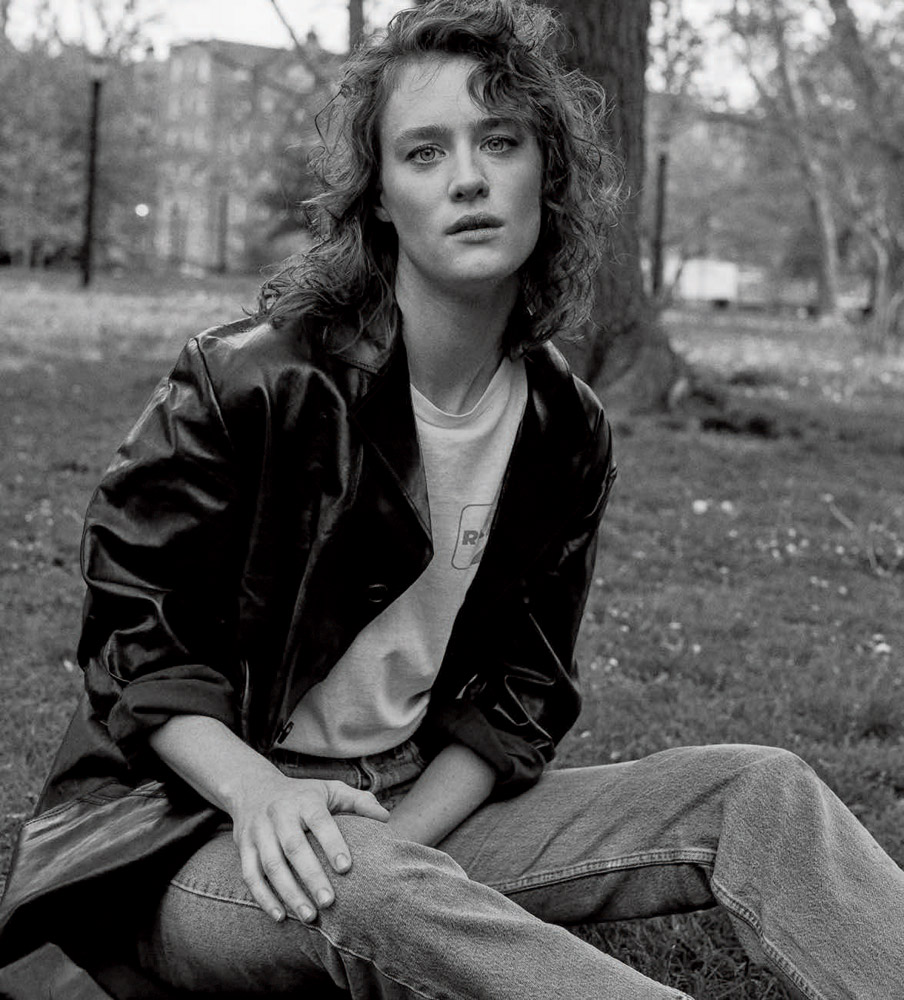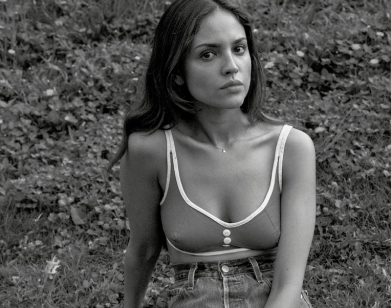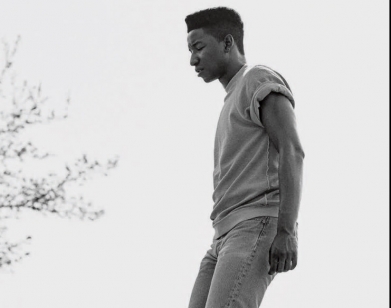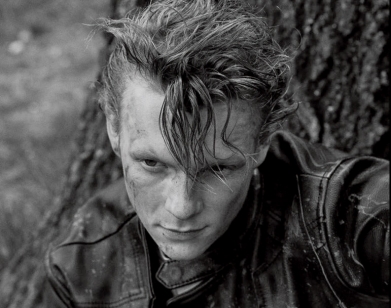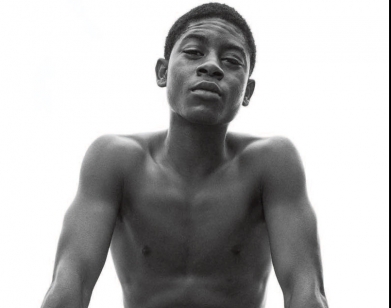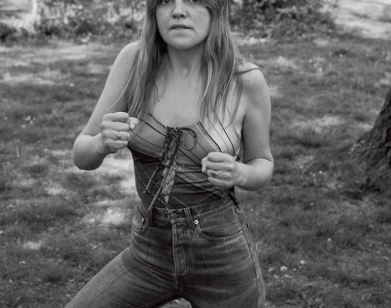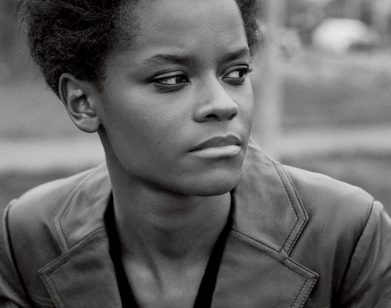Mackenzie Davis
Mackenzie Davis is lying next to me in a bed at the Bowery Hotel in downtown New York. She has taken off her pleated skirt to get a bit more comfortable and is uncorking a bottle of white wine with the precision of a master sommelier. We swore we wouldn’t drink—as a rule, it’s best not to mix alcohol and interviews—but then again, this interview isn’t exactly normal for either of us.
A native of Vancouver, Davis studied English at McGill University in Montreal—which is where we met and quickly became friends. Even then, her dream was to make movies, and she spent much of those earlier years honing her craft with secret acting classes and in school plays. Shortly after graduating, she moved to New York and stepped into the revolving door that’s so familiar to aspiring stars: auditions, in person and on tape; meetings and callbacks and screen tests; and the inevitable, “They decided to go with someone a little more established.”
Then, in 2011, Davis met the director Drake Doremus, who, following the critical success of the romantic millennial movie Like Crazy (2011), cast her alongside Felicity Jones, Guy Pearce, and Amy Ryan in the largely improvised family drama Breathe In (2013). As a young woman grappling with her father’s infidelity, Davis conveyed anger, jealousy, and a wide-eyed innocence—sometimes all at once, without even saying a word. Offers began to roll in, not quickly but steadily, across genres: a romantic comedy (That Awkward Moment, 2014, with Zac Efron and Miles Teller), an Oscar-nominated space odyssey (Ridley Scott’s The Martian, 2015), and a feminist indie (Sophia Takal’s Always Shine, 2016). For much of that time, she also starred on one of the most acclaimed—and overlooked—shows on television. In AMC’s tech-centric period drama Halt and Catch Fire, now entering its fourth and final season, Davis plays Cameron Howe, who grows from a punk coder into a shrewd businesswoman at the advent of the internet.
With that project coming to an end, the 30-year-old actress, now based in Los Angeles, is shifting her focus to her two upcoming films: as something of a cipher opposite Ryan Gosling in Blade Runner 2049, the long-awaited sequel to the 1982 masterpiece, and as a night nurse opposite Charlize Theron in the Jason Reitman two-hander Tully. That was her résumé. This is my friend.
NICK HARAMIS: So, uh, this is cool. When we were kids, we used to say that one day I would run a magazine and you would be a famous actress, and we would do an interview together.
MACKENZIE DAVIS: It’s a hard thing to explain to other people because it sounds very superficial and nepotistic, but doing this interview is actually a very deep, dream-fulfilling aspect of our relationship.
HARAMIS: I’m not sure I thought that it would actually happen.
DAVIS: That’s because we first talked about it shortly after you saw me perform the lead role in a school production of Legally Blonde: The Musical, and you were less than impressed by my stage presence. [both laugh]
HARAMIS: I don’t remember you being all that open about your ambitions as an actress back then.
DAVIS: Acting was always something I pursued by myself. When we were in college, I took an acting class that I was so passionate about and devoted to, but I went to it privately and never really spoke about it. I’d have these ecstatic experiences in, like, a church basement and then never talk about it with other people.
HARAMIS: Was I not introduced to you as an actress before we became friends?
DAVIS: In The Vagina Monologues back in 2009. I did the one with all the orgasming.
HARAMIS: I get a bit blurry on what happened next because I feel we’ve rewritten our origin story over the years.
DAVIS: As a good friend of ours once said, “You guys think you’re the stars in your own movie.”
HARAMIS: Which I took as a compliment!
DAVIS: But which was meant as an insult. [laughs] This stroll down memory lane is going to be so boring for everyone but us.
HARAMIS: Meanwhile, this issue’s other cover stars have been interviewed by, like, Matthew McConaughey and Zendaya. But we can’t stop now. So, fast-forward a few years.
DAVIS: I took a semester off to pursue modeling. I went to Europe and, as I’ve been told, ate my way out of a career. [laughs] So then I came to New York, where you were living, and we painted the town red. I Google-searched your name the other day, something I like to do periodically, and the images of us from that time are so damning. Remember that stocking phase I went through? When I didn’t wear pants?
HARAMIS: We were so delusional in thinking we were It kids. I remember being so jealous when we went to a party together and only your name showed up in Page Six the next day.
DAVIS: I left New York directly after that because there was nowhere to go but down.
HARAMIS: But you came back so often it’s like you never really left. I remember you calling me up at work, crying hysterically, because you had gotten the part in Breathe In, your first movie.
DAVIS: I reacted like I’d just won Miss Universe or something, like nothing better had ever happened to me. And it was true. Nothing better had ever happened to me, but I wish I could temper some of my outward displays of emotion. I remember sitting on the subway after I’d found out, and you know that scene in Unfaithful where Diane Lane is recalling the adulterous sex that she had? Her head is against a window and she’s laughing and reliving the sex. I was sitting on the train, tears pouring down my eyes, thinking, “Nobody knows the world of emotion I’m inhabiting right now.” And then I called you.
HARAMIS: You told me not to tell anyone, so I immediately told everyone in the office because I, too, am not great with tempering public displays of emotion.
DAVIS: But, like, who was going to call the trades with the news, “Extra! Extra! Unknown thesp gets work!”
HARAMIS: At what point did acting begin to feel like a thing that was no longer going to be taken away from you?
DAVIS: I don’t think that ever goes away. I think there are times when you’re jamming with the universe, and other times when it feels like no matter how hard I work, no matter how good a person I am, I will always be punished for being mediocre. I don’t feel scared about Halt and Catch Fire ending, but I am aware that it will be a seismic shift in the certainty in my life. It was such a big deal for me to work on that show. I was still very much a novice when I started.
HARAMIS: One thing about your acting is that it feels so unlearned. It’s like you didn’t take the right classes, and so you deliver lines in a way that most actors never would. I think that’s what makes you so magnetic to watch. Somehow the deficit becomes the thing that makes you such a thrill to see in performances. Okay, so Halt provides a seismic shift in your career, and then …
DAVIS: We already used seismic shift—don’t use that again. [laughs]
HARAMIS: I remember so clearly when you were in That Awkward Moment. We went to the premiere in L.A., and as we were pulling up in the SUV, you were trying to convince me to walk the red carpet with you—which for a moment I considered until I realized how truly terrible an idea that was. But, yeah, you were really nervous and there were so many screaming fans, for Zac Efron—
DAVIS: For me.
HARAMIS: [laughs] And you didn’t want to get out of the car. But less than two years later we were in Toronto for The Martian premiere, and I was trying to give you a bit of a pep talk before you got out of the car, like, “Mack, you’ve got this. Don’t be nervous.” And before I could even finish my motivational speech, your door was open and you were twirling on the red carpet. [laughs]
DAVIS: That’s the only time I’ve felt comfortable at one of those things, because it was such a spectacle.
HARAMIS: You never really got stopped on the street, though, until your episode of Black Mirror came out. How do you deal with being aware of people being aware of you?
DAVIS: I struggle with it a bit, but I don’t want to be precious or weird about it. It’s lovely to be recognized by people who like your work, and it’s not as if I’ve done a Marvel movie. People say that with great power comes great responsibility, but it’s more like shitty things will happen if you take certain jobs. One of the reasons I don’t do social media is that I like the feeling that if somebody asks me for a picture on the street, I don’t have to say yes.
HARAMIS: I’ve been with you when you’ve said no.
DAVIS: But I’m always down to chill with people. I’m so happy to have a conversation. But, yeah, I feel like if you’re always exposing yourself, if you’re always engaging with social media in that way, then you no longer have the right to say no. And I want to retain that right, for as long as I can.
HARAMIS: When you were preparing to shoot the first season of Halt, you read books on coding and computers and stuff that made my eyes glaze over. Now that you’re entering the fourth and final season of the show, do you feel like you’ve become Cameron, or that you fully understand her now?
DAVIS: No. At the beginning of every season, I feel pretty lost again. I know who she was but I don’t know who she is now. I still do a lot of reading and a lot of weird invisible work, as if I’m building a wall that will at some point be finished. But instead it’s just me thinking and walking and thinking and reading. When I was younger, I wanted to guard myself against criticism, so I did so much more work than was needed. Now, though, it’s sometimes better to understand something intuitively than have to dig your way into a character.
HARAMIS: How hard is it to convincingly become someone so outside of your own world, like the NASA technician you played in The Martian?
DAVIS: But there was such a clear emotional pull in that movie. I was like a mother bird bringing home an egg.
HARAMIS: But the egg was Matt Damon, and you definitely had some Joey Tribbiani lines, like, “The anti-gravitational pull from the J-47 is on a crash course with the starship!”
DAVIS: It’s not about the world they occupy; it’s about the drive they have in that world—
HARAMIS: I’d just like to make a note here, dear reader, that Mackenzie’s tone has devolved into didacticism.
DAVIS: [laughs] You can make a beautiful, airtight world that’s fascinating to look at, but it’s not interesting unless you have a character that’s trying to achieve something under the circumstances of that world. It’s harder to play a wacky girlfriend whose journey you just don’t understand. Or give a shit about.
HARAMIS: Tell me about Blade Runner 2049. [whispers] Are people allowed to know that—
DAVIS: Uh, no, Nick. Definitely not. I can say that it’s a sequel to Blade Runner, so it’s kind of a world we recognize but further along in the sort of climate change evolutionary process.
HARAMIS: Can’t wait for you to do a talk show and really set up that clip.
DAVIS: [laughs] A weird thing about being an actress is that shooting movies doesn’t feel like watching movies. It feels like being in a warehouse.
HARAMIS: It’s like me with restaurants. Having worked at an Applebee’s, I have a higher expectation for good service.
DAVIS: I don’t think you want to know how the sausage gets made if you really love movies. Or Applebee’s.
HARAMIS: Or sausage.
DAVIS: It’s pretty rare that I watch a movie now without seeing the script in a way that I hate, where I can see the stage directions and the choices that the actors are making.
HARAMIS: Last fall, you also shot Tully, the Jason Reitman movie with Charlize Theron.
DAVIS: Yeah, Charlize plays a mother of three who is totally overworked and overwhelmed with all of this invisible labor in her household while her husband, who’s a very nice guy and a great dad, goes to work every day and doesn’t see all that she does to keep things running. So her brother gets her a night nanny, which is somebody who comes into your house and watches your newborn while you sleep. But then the mother and the nurse start hanging out at night. I’m the nurse, and the movie is about that relationship.
HARAMIS: I’ve only met Charlize that night we all went to see a Broadway show together, but she seems amazing. We went out for pizza and tequila shots after the show.
DAVIS: Yeah, she’s such a dude.
HARAMIS: She kept grabbing the padded underwear I had on to make my butt look bigger.
DAVIS: We all remember what you were wearing. [both laugh] It continues to be my experience that the people who get the most work are the coolest people. They’re the people you want to be around.
HARAMIS: Do you feel at home in Hollywood?
DAVIS: I don’t. I’m definitely not successful at being a starlet, and I would like to some day figure out how to have my picture taken. It’s an ongoing journey for me, the Pretty Woman syndrome. I want to believe that all that matters is the work, that the idea of Hollywood is just that—an idea. But I also know that people will Google your name, that when somebody suggests you for a part, the first thing they do is look at you as an actress, not as a character in that role, which I find genuinely disconcerting.
HARAMIS: How has the feeling of being in front of a camera changed for you since your first movie?
DAVIS: It hasn’t. I feel really comfortable when the camera is rolling. I feel less comfortable in the moments before and after, like, “Okay, where do I sit now?” I find the social aspect of being on a project … it’s just a lot. There are so many new people, and it’s a lot of introducing the most charming, most engaging, funniest version of yourself to, essentially, a bunch of strangers you already know too many details about.
HARAMIS: When I started at Interview, I wasn’t nervous about the work. I was nervous about having to ask where the restroom is.
DAVIS: So? Where is it?
HARAMIS: I’m still looking.
NICK HARAMIS IS INTERVIEW’S EDITOR IN CHIEF.
For more from our “Youth in Revolt” portfolio, click here.

